Erich Grotewold
See book keywords and concepts |
 CONCLUDING REMARKS
Intensive epidemiological studies have shown consistently that regular consumption of fruits and vegetables is associated with reduced risk of chronic diseases such as cancer and cardiovascular disease (Willett, 2002; Block et al, 1992). However, the individual antioxidants of these foods studied in clinical trials, including ^-carotene, vitamin C, and vitamin E, do not appear to have consistent preventive effects comparable to the observed health benefits of diets rich in fruits and vegetables (Omennetal, 1996). CONCLUDING REMARKS
Intensive epidemiological studies have shown consistently that regular consumption of fruits and vegetables is associated with reduced risk of chronic diseases such as cancer and cardiovascular disease (Willett, 2002; Block et al, 1992). However, the individual antioxidants of these foods studied in clinical trials, including ^-carotene, vitamin C, and vitamin E, do not appear to have consistent preventive effects comparable to the observed health benefits of diets rich in fruits and vegetables (Omennetal, 1996). |
Mehmet C. Oz., M.D. and Michael F. Roizen, M.D.
See book keywords and concepts |
 Thankfully, the following foods are good not only because of the heart-healthy nutrients they deliver but because they have strong anti-inflammatory effects.
þ fruits and vegetables. Many fruits and vegetables—specifically red grapes, cranberries, tomatoes, onions, and tomato juice-contain powerful antioxidants called flavonoids and carotenoids. Found in colorful foods, flavonoids and carotenoids are vitamin-like nonessential substances that seem to decrease inflammation by handcuffing those damaging oxygen free radicals and stimulating your body to take them out of your system through urine. Thankfully, the following foods are good not only because of the heart-healthy nutrients they deliver but because they have strong anti-inflammatory effects.
þ fruits and vegetables. Many fruits and vegetables—specifically red grapes, cranberries, tomatoes, onions, and tomato juice-contain powerful antioxidants called flavonoids and carotenoids. Found in colorful foods, flavonoids and carotenoids are vitamin-like nonessential substances that seem to decrease inflammation by handcuffing those damaging oxygen free radicals and stimulating your body to take them out of your system through urine. |
Lester A. Mitscher and Victoria Toews
See book keywords and concepts |
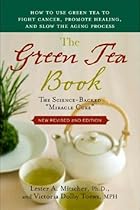 Part of the reason that a diet rich in fruits and vegetables contributes to good health is that these foods contain a .great many unique antioxidants in addition to the variety of vitamins, minerals, and fiber they provide. Moreover, tea may make an even greater contribution than fruits and vegetables. In a comparison of the antioxidant activity of various vegetables (including garlic, spinach, broccoli, kale, Brussels sprouts, onions, and many others) with the antioxidant activity of green and black tea, the teas were found to have a greater ability to quench free radicals than the vegetables. Part of the reason that a diet rich in fruits and vegetables contributes to good health is that these foods contain a .great many unique antioxidants in addition to the variety of vitamins, minerals, and fiber they provide. Moreover, tea may make an even greater contribution than fruits and vegetables. In a comparison of the antioxidant activity of various vegetables (including garlic, spinach, broccoli, kale, Brussels sprouts, onions, and many others) with the antioxidant activity of green and black tea, the teas were found to have a greater ability to quench free radicals than the vegetables. |
Erich Grotewold
See book keywords and concepts |
 It is a general theme that the additive and synergistic effects of phytochemicals and nutraceuticals in fruits and vegetables are responsive for their potent antioxidant and anticancer activities and that the benefit of a diet rich in fruits and vegetables is attributed to the complex mixture of phytochemicals and nutraceuticals present in whole foods (Liu, 2004). It is a general theme that the additive and synergistic effects of phytochemicals and nutraceuticals in fruits and vegetables are responsive for their potent antioxidant and anticancer activities and that the benefit of a diet rich in fruits and vegetables is attributed to the complex mixture of phytochemicals and nutraceuticals present in whole foods (Liu, 2004). |
Donna Jackson Nakazawa
See book keywords and concepts |
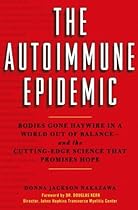 To avoid food contamination, use common sense: wash produce including leafy greens well (one autoimmune disease specialist suggests washing all leafy greens three times); be sure to refrigerate all cut, peeled, or cooked fresh fruits and vegetables within two hours; wash cutting boards and peelers well; use separate cutting boards for produce versus meats; throw away fruits or vegetables that have touched raw meat, poultry, seafood, or their juices; and cut away bruised or damaged portions of fruits and vegetables before eating them. To avoid food contamination, use common sense: wash produce including leafy greens well (one autoimmune disease specialist suggests washing all leafy greens three times); be sure to refrigerate all cut, peeled, or cooked fresh fruits and vegetables within two hours; wash cutting boards and peelers well; use separate cutting boards for produce versus meats; throw away fruits or vegetables that have touched raw meat, poultry, seafood, or their juices; and cut away bruised or damaged portions of fruits and vegetables before eating them. |
Mark Sircus
See book keywords and concepts |
 The human body can thrive on fruits and vegetables that are grown on vital rich soil but not on soil that is artificially pumped up with chemicals." Thus today hardly anyone can eat enough fruits and vegetables to supply his or her body with the mineral salts required for good health.
It is crucial that doctors and parents recognize that from poor soil comes poor food, deficient in minerals and vitamins
Dr. Nan Kathryn Fuchs, author of The Nutrition Detective, says that, "Our diets today are very different from those of our ancestors though our bodies remain similar. The human body can thrive on fruits and vegetables that are grown on vital rich soil but not on soil that is artificially pumped up with chemicals." Thus today hardly anyone can eat enough fruits and vegetables to supply his or her body with the mineral salts required for good health.
It is crucial that doctors and parents recognize that from poor soil comes poor food, deficient in minerals and vitamins
Dr. Nan Kathryn Fuchs, author of The Nutrition Detective, says that, "Our diets today are very different from those of our ancestors though our bodies remain similar. |
Tom Bohager
See book keywords and concepts |
 Generally speaking, fruits and vegetables are more alkaline-forming, while meats, sugar, caffeine, beans, dairy, and grains are more acid forming.
Notice the term "generally speaking" in the previous sentence. Gabriel Cousens, in Conscious Eating, mentions the complexity of this topic. His research has shown that about 30 percent of the people he counseled responded exactly opposite to this claim. In other words, the fruits and vegetables they ate made them more acidic. So we must be willing to take the time to determine individually what foods will work best for us. Generally speaking, fruits and vegetables are more alkaline-forming, while meats, sugar, caffeine, beans, dairy, and grains are more acid forming.
Notice the term "generally speaking" in the previous sentence. Gabriel Cousens, in Conscious Eating, mentions the complexity of this topic. His research has shown that about 30 percent of the people he counseled responded exactly opposite to this claim. In other words, the fruits and vegetables they ate made them more acidic. So we must be willing to take the time to determine individually what foods will work best for us. |
Mike Adams, the Health Ranger
See article keywords and concepts |
 The benefits of healthy intestines
When a large intestine is healthy -- when it is not carrying putrefied, undigested food matter and instead contains healing, cleansing phytonutrients like chlorophyll from fresh fruits and vegetables -- it is going to perform its function well. A person who has a healthy large intestine will reflect that in their complexion. Their skin will look young. This helps explain why people who routinely engage in a lot of juicing -- drinking the juice from raw fruits and vegetables -- have such healthy looking skin. The benefits of healthy intestines
When a large intestine is healthy -- when it is not carrying putrefied, undigested food matter and instead contains healing, cleansing phytonutrients like chlorophyll from fresh fruits and vegetables -- it is going to perform its function well. A person who has a healthy large intestine will reflect that in their complexion. Their skin will look young. This helps explain why people who routinely engage in a lot of juicing -- drinking the juice from raw fruits and vegetables -- have such healthy looking skin. |
Mike Adams, the Health Ranger
See article keywords and concepts |
 You can simply mix some powder with purified water to make your own gel, then dip fruits and vegetables in the gel yourself. Apples, cucumbers, zucchini, tomatoes, peaches, potatoes, grapes and many other food items can be preserved in this way. And when you're done dipping produce in the gel, you can either drink the gel in a smoothie or put it on your skin as a skin rejuvenation treatment. None of the aloe goes to waste, and your fruits and vegetables will last far longer! (This is especially useful for organic produce, which tends to ripen more quickly. You can simply mix some powder with purified water to make your own gel, then dip fruits and vegetables in the gel yourself. Apples, cucumbers, zucchini, tomatoes, peaches, potatoes, grapes and many other food items can be preserved in this way. And when you're done dipping produce in the gel, you can either drink the gel in a smoothie or put it on your skin as a skin rejuvenation treatment. None of the aloe goes to waste, and your fruits and vegetables will last far longer! (This is especially useful for organic produce, which tends to ripen more quickly. |
Marshall Editions
See book keywords and concepts |
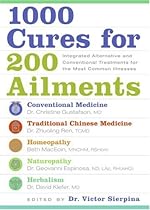 Make sure you eat a well-balanced diet that includes plenty of fresh fruits and vegetables, whole grains, legumes, and quality protein (fish, lean chicken, and beans) everyday. Eat plenty of green leafy vegetables for their high nutrient content, which will provide a base of nutrients required for healthy nails.
Supplements: There is some scientific evidence that the B vitamin biotin may help treat nail problems, especially brittle nails. Make sure you eat a well-balanced diet that includes plenty of fresh fruits and vegetables, whole grains, legumes, and quality protein (fish, lean chicken, and beans) everyday. Eat plenty of green leafy vegetables for their high nutrient content, which will provide a base of nutrients required for healthy nails.
Supplements: There is some scientific evidence that the B vitamin biotin may help treat nail problems, especially brittle nails. |
Mehmet C. Oz., M.D. and Michael F. Roizen, M.D.
See book keywords and concepts |
 Vitamin C: Research shows that people who eat more fruits and vegetables (which contain vitamin C and other bioflavonoids) are less likely to develop eye conditions than those who eat fewer.
þ Glutathione: Eggs, garlic, avocados, asparagus, and onions have the free-radical scavenger glutathione, which has been shown to be effective for preventing cataracts (at 500 mg dose). The supplement n-acetylcysteine also helps (also 500 mg daily dose). Vitamin C: Research shows that people who eat more fruits and vegetables (which contain vitamin C and other bioflavonoids) are less likely to develop eye conditions than those who eat fewer.
þ Glutathione: Eggs, garlic, avocados, asparagus, and onions have the free-radical scavenger glutathione, which has been shown to be effective for preventing cataracts (at 500 mg dose). The supplement n-acetylcysteine also helps (also 500 mg daily dose). |
Marshall Editions
See book keywords and concepts |
 Eat a well-balanced diet that includes fresh fruits and vegetables, legumes, and quality protein (fish, lean chicken, and beans) every day. Eat plenty of green leafy vegetables for their high nutrient content. This will provide a good base of the nutrients required for a healthy immune system. Make sure you get enough anti-inflammatory essential fatty acids (omega-3s) in the form of fatty fish, walnuts, flax seeds, cod liver oil, fish oil, and flax seed oil. Also make sure you drink plenty of water— aim for at least eight glasses a day. Eat a well-balanced diet that includes fresh fruits and vegetables, legumes, and quality protein (fish, lean chicken, and beans) every day. Eat plenty of green leafy vegetables for their high nutrient content. This will provide a good base of the nutrients required for a healthy immune system. Make sure you get enough anti-inflammatory essential fatty acids (omega-3s) in the form of fatty fish, walnuts, flax seeds, cod liver oil, fish oil, and flax seed oil. Also make sure you drink plenty of water— aim for at least eight glasses a day. |
J. Douglas Bremner
See book keywords and concepts |
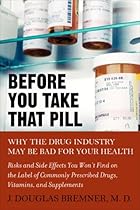 For instance, the Life Extension Foundation (affiliated with the vitamin and supplement manufacturer Life Extension), reported that the number of vitamins in fruits and vegetables farmed in the U.S. has been declining over the past fifty years. In the September 2005 issue of Life Extension magazine, the foundation stated that "for those who find the new, unregulated world of genetically manipulated vitaminless vegetables unpalatable—or find that they don't want to eat vegetables that have absorbed . . . pesticides in the soil . . . For instance, the Life Extension Foundation (affiliated with the vitamin and supplement manufacturer Life Extension), reported that the number of vitamins in fruits and vegetables farmed in the U.S. has been declining over the past fifty years. In the September 2005 issue of Life Extension magazine, the foundation stated that "for those who find the new, unregulated world of genetically manipulated vitaminless vegetables unpalatable—or find that they don't want to eat vegetables that have absorbed . . . pesticides in the soil . . . |
| Patients with IBS commonly can't tolerate a number of foods, including milk, wheat, eggs, and fresh fruits and vegetables. IBS patients do not, however, have a greater lactase deficiency (the enzyme that digests dairy products) or inability to absorb sugars (like fructose) when measured in the laboratory, although they may have more symptoms when exposed to these compounds outside the lab. A variety of herbs, food products, and other supplements have been promoted for the treatment of bowel symptoms, constipation and dyspepsia. |
| We are continuously discovering more beneficial effects of the nutrients found in fruits and vegetables, so it is always better to eat these primary sources of vitamins rather than to take them in pill form.
Vitamins and Nutrition
Vitamins got their name because they are "vital to life," meaning that if you are completely deprived of them for a long enough period of time, you become sick. One hundred years ago many of our forefathers did suffer from malnutrition. That was an age of undernutrition. |
| Most of the oversalting in our system comes from the preprepared, packaged, and many frozen foods (with the exception of flash-frozen fruits and vegetables) we eat as well as from restaurant and fast foods. Food makers put huge amounts of salt in their food to enhance flavor, to hide the lack of other natural flavorings, and to act as a preservative. Look at any food label, and you will see astronomical percentages of salt in food, often more than 25% of a serving. The best way to avoid excess sodium in food is to buy fresh, unprocessed whole foods and prepare your own meals. |
Ron Garner
See book keywords and concepts |
 Scrub fruits and vegetables to remove sprays, toxins and dirt, after soaking for 10 or 15 minutes in water that has had a tablespoon or more of unpasteurized apple cider vinegar added to it.
Lightly steam vegetables; they should still be a bit crispy after steaming.
Lightly stir-fry vegetables with water, unsalted butter, or olive oil. Use a minimum of hot spices.
JUICING
Consuming fresh raw fruit and vegetable juices regularly can be one of the fastest ways of returning to vibrant health. Scrub fruits and vegetables to remove sprays, toxins and dirt, after soaking for 10 or 15 minutes in water that has had a tablespoon or more of unpasteurized apple cider vinegar added to it.
Lightly steam vegetables; they should still be a bit crispy after steaming.
Lightly stir-fry vegetables with water, unsalted butter, or olive oil. Use a minimum of hot spices.
JUICING
Consuming fresh raw fruit and vegetable juices regularly can be one of the fastest ways of returning to vibrant health. |
| Our taste buds can be re-awakened to detect the superior taste of prime raw fruits and vegetables, making cooked foods less appealing. As cells throughout the body start to get healthier from the intake of true nutrition, the body's innate intelligence begins to function more efficiently, increasing the body's desire for living foods.
Calories in Raw Food
Calories essentially have nothing to do with nutrition because a calorie is only a measure of heat energy. Raw foods contain calories as well as all the other live factors necessary for their utilization. |
| Depending on the amount of raw fruits and vegetables we eat, our activity level, and the air temperature we live and work in, our bodies require the equivalent of 6 to 8 full glasses of water, or about one half ounce per pound (33 ml per kilogram) of body weight, each day. Other liquids such as coffee, tea, soft drinks, and alcohol do not qualify as fluids that meet our daily water requirement.
While the body needs an adequate amount of good water for health each day, too much can also be stressful. When consumed with meals, water interferes with digestion. |
| Antioxidant Sources
A healthy diet of raw fruits and vegetables contains naturally-occurring antioxidants. Many supplements, such as vitamins A, C, E, selenium, and coenzyme Qio, are antioxidants. More recently, stronger antioxidants have been discovered and developed. Among these are: pycnogenol, which is a water extract from the bark of the French maritime pine; grape seed extract; tocotrienols; vitamin C ester; alpha lipoic acid; dmae; and alpha and beta hydroxy acids. |
| As we add more raw fruits and vegetables to our meals we will naturally begin to eat less of the other foods. As time goes on, and as the body begins to respond to the supply of fresh wholesome nutrients, we will find that the old foods start to lose some of their appeal. What we used to eat every meal or every day, we begin to eat every other day, then twice a week, then once a week, and so on.
To occasionally "fall off the wagon" is no reason to feel badly. The thing to do is not to gorge on the wrong foods. For instance, eat a piece of pizza but not three or four. |
| POSSIBLE FOOD SENSITIVITIES OR ALLERGIES
In the beginning, when a change is made from consuming wrong foods to introducing more raw fruits and vegetables into the diet, many people experience difficulties with digestion. There can be a lack of hydrochloric acid and digestive enzymes plus existing inflammation in the intestines because their digestive systems have been weakened from years of abuse. Symptoms can be similar to irritable bowel syndrome. |
J. Douglas Bremner
See book keywords and concepts |
 Potassium, a mineral essential for bodily function, is present is many fruits and vegetables, including broccoli, orange juice, potatoes, bananas, soybeans, avocados, apricots, pomegranates, parsnips and turnips. Potassium is essential for muscle action as well as function of the nerves. Low serum potassium, or hypokalemia, is a potentially fatal condition that can be associated with symptoms of muscle weakness, confusion, dizziness that can lead to falls, and heart arrhythmias. For people with a healthy diet, it is not a problem. Potassium, a mineral essential for bodily function, is present is many fruits and vegetables, including broccoli, orange juice, potatoes, bananas, soybeans, avocados, apricots, pomegranates, parsnips and turnips. Potassium is essential for muscle action as well as function of the nerves. Low serum potassium, or hypokalemia, is a potentially fatal condition that can be associated with symptoms of muscle weakness, confusion, dizziness that can lead to falls, and heart arrhythmias. For people with a healthy diet, it is not a problem. |
| We smoke less, have better access to nutritious fruits and vegetables year-round, pay more attention to cleanliness and hygiene, and have improved safety in general. For instance, in the nineteenth century it was not known that dirty water and shared cups could spread disease. |
Lester A. Mitscher and Victoria Toews
See book keywords and concepts |
 Wei Zheng from the University of Minnesota, who reported his study of tea drinking and cancer risk in 35,000 Iowa women, also noted in his study that tea drinkers ate more fruits and vegetables than non-tea drinkers. However, this did not interfere with his conclusion that the risk for cancer of any site was 10 percent lower among those drinking two or more cups of tea daily.5
Another group of researchers questioned whether the results of their study were affected by the healthful diets common to tea drinkers. Wei Zheng from the University of Minnesota, who reported his study of tea drinking and cancer risk in 35,000 Iowa women, also noted in his study that tea drinkers ate more fruits and vegetables than non-tea drinkers. However, this did not interfere with his conclusion that the risk for cancer of any site was 10 percent lower among those drinking two or more cups of tea daily.5
Another group of researchers questioned whether the results of their study were affected by the healthful diets common to tea drinkers. |
Ray D. Strand
See book keywords and concepts |
 Physicians also realize that patients who eat a low-fat diet, which includes at least seven servings of fruits and vegetables daily, enjoy further health benefits. These include:
• weight loss.
• a decreased risk of diabetes.
• a decreased risk of heart disease.
• a decreased risk of almost all cancers.
• a decreased risk of high blood pressure.
• a decreased risk of elevated cholesterol.
• an enhanced immune system.
• an increased sensitivity to insulin.
• increased energy and ability to concentrate.
Let's face it: a healthy diet is a win/win situation! Physicians also realize that patients who eat a low-fat diet, which includes at least seven servings of fruits and vegetables daily, enjoy further health benefits. These include:
• weight loss.
• a decreased risk of diabetes.
• a decreased risk of heart disease.
• a decreased risk of almost all cancers.
• a decreased risk of high blood pressure.
• a decreased risk of elevated cholesterol.
• an enhanced immune system.
• an increased sensitivity to insulin.
• increased energy and ability to concentrate.
Let's face it: a healthy diet is a win/win situation! |
Michael Pollan
See book keywords and concepts |
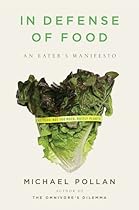 Matters got even sketchier in the second section of the survey, when I was asked to specify how many times in the last three months I'd eaten a half-cup serving of broccoli, among a dizzying array of other fruits and vegetables I was asked to tally for the dietary quarter. I'm not sure Marcel Proust himself could recall his dietary intake over the last ninety days with the sort of precision demanded by the FFQ.
When you get to the meat section, the portion sizes specified haven't been seen in America since the Hoover administration. Matters got even sketchier in the second section of the survey, when I was asked to specify how many times in the last three months I'd eaten a half-cup serving of broccoli, among a dizzying array of other fruits and vegetables I was asked to tally for the dietary quarter. I'm not sure Marcel Proust himself could recall his dietary intake over the last ninety days with the sort of precision demanded by the FFQ.
When you get to the meat section, the portion sizes specified haven't been seen in America since the Hoover administration. |
| In countries where people eat a pound or more of fruits and vegetables a day, the rate of cancer is half what it is in the United States. We also know that vegetarians are less susceptible to most of the Western diseases, and as a consequence live longer than the rest of us. (Though near vegetarians—so-called flexitarians—are just as healthy as vegetarians.) Exactly why this should be so is not quite as clear as the fact that it is. |
Mehmet C. Oz., M.D. and Michael F. Roizen, M.D.
See book keywords and concepts |
 Better: Eat more fruits and vegetables, which may be the best bet for bone health.
Friendly Fat? place. But if you are prone to it, there are medications available that can help control and slow bone loss, as well as aid in the treatment of symptoms associated with it. In addition to hormone replacement, the bisphosphonates (alendronate, ibandronate, and risedronate), calcitonin, and raloxifene are antiresorptive medications, which slow or stop the bone-resorbing portion of the bone-remodeling cycle without slowing the bone-forming portion of the cycle. Better: Eat more fruits and vegetables, which may be the best bet for bone health.
Friendly Fat? place. But if you are prone to it, there are medications available that can help control and slow bone loss, as well as aid in the treatment of symptoms associated with it. In addition to hormone replacement, the bisphosphonates (alendronate, ibandronate, and risedronate), calcitonin, and raloxifene are antiresorptive medications, which slow or stop the bone-resorbing portion of the bone-remodeling cycle without slowing the bone-forming portion of the cycle. |












